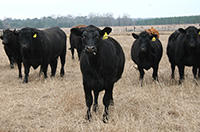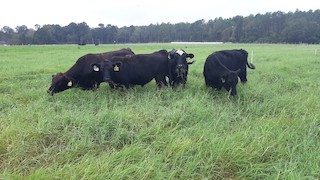There are approximately 4 million acres of pasture, hay and silage in Georgia (10 percent of the state). This includes 3.4 million acres of pasture land and about 600,000 acres of hay land. The total of all other field crops is less than 3 million acres.
Georgia forages include bermudagrass, tall fescue, annual ryegrass, bahiagrass, and white clover, among others.
Our Programs and Services
-
GrassMasters Program Seven-week series focusing on forage production.
-
Lab Testing and Analysis Services Testing for soil, plant tissue, water quality, animal waste, feeds and forages, pesticides, and much more!
-
On-Site and Telephone Consultation Available in many county offices for ag producers.
-
Pesticide Safety Education Program Topics include pest identification, storage and disposal, pesticide drift and runoff prevention, water quality protection, and food safety.
-
Production Meetings Updates on local issues for growers and producers.
Recent Publications
-
Baleage Production and Use (B 1532) Implementing a baleage system takes consideration and planning. Producers need to weigh the benefits, challenges, and costs to optimize their forage production and livestock feeding operations. Baleag…
-
How to Use a Grazing Stick (B 1567) Grazing management requires accurate estimates of forage availability to adjust forage supply to meet animal needs. However, incorrect forage availability estimates can negatively impact important gra…
-
Understanding Stocking Rate in Pasture Systems (B 1568) A good grazing management plan is essential to producer success for any grazing livestock production system. One of the keys to building a grazing management plan is to have a good understanding of th…
-
Annual Ryegrass Control in Georgia Hayfields (C 1078) Annual ryegrass (Lolium multiflorum), also referred to as Italian ryegrass, is the most problematic winter annual weed in Georgia hayfields. Seed germinates from September to November when soil temper…
Websites
UGA-affiliated sites
UGA Extension Forage Team Blog A blog about forage production written by UGA Extension agents.
Forages at UGA A wide variety of forage management issues and information about adapted species, establishment guidelines, fertilization guidelines, pest management, publications, archives, FAQs, a glossary and links.
Sustainable Agriculture at UGA Brings together information on sustainable agriculture including management intensive grazing and other resources.
Institute of Plant Breeding, Genetics and Genomics IPBGG faculty actively engage in training of graduate students, the development of new crop varieties, and basic research on the genetics and understanding of crop traits important to agriculture and human kind.
Management-Intensive Grazing An overview of management-intensive grazing (MIG), which refers to several grazing systems wherein animals are allowed to graze only a small portion of the pasture while others areas are rested and allowed to recover.
Soil and Forage Test Labs Links and information regarding UGA's Soil, Plant and Water Lab.
Statewide Variety Testing Results from UGA's annual summer and winter forages performance tests.
Switchgrass at UGA This site provides basic information about switchgrass and its use as a bioenergy crop, forage crop, and habitat for wildlife.
UGA Department of Crop and Soil Sciences Learn more about the crop and soil sciences department at the UGA College of Agricultural and Environmental Sciences.
Commodity Teams at CAES Teams made up of research scientists and extension specialists work together to provide the latest technology and information for efficient, profitable production of some of Georgia's most valuable commodities.
External sites
American Forage and Grassland Council Non-profit organization providing educational and networking resources for the forage and grassland industry. Their site features industry resources and information about upcoming events, competitions, professional development, membership, affiliate councils and contact information.
-
Hill Awards The Walter Barnard Hill Awards recognize sustained, distinguished, superb achievement and contributions to improving the quality of life in Georgia or elsewhere.

-
Cattle Emissions It is true that cattle produce methane, but it is a natural process that is balanced by carbon sequestered in soil and plants.

-
Re-establishing Alfalfa Grazing specialist Jennifer Tucker is leading efforts to develop best management practices to restore grasslands and sustainably increase alfalfa production in the Southeast.

